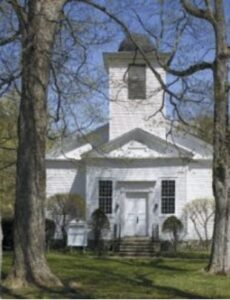October 3, 2023
Greetings, friends,
Last Sunday, members of the presbytery gathered with Second Presbyterian Church, Homewood, for the final service of worship in their building. The building will be sold and the remaining members of the church are pursuing a merger with Edgewood Presbyterian just down the road. It was a beautiful service complete with a wonderful history by Marilyn Gross, a litany of commendation, beautiful music by the combined choirs of both congregations and a final recessional as we followed the cross, Bible, baptismal font, and paraments out of the building and into God’s future. All those symbols of our faith will find a home at Edgewood. As you might imagine, it was an emotional day but one suffused, too, with thanksgiving and with hope.
 A friend of mine who now serves as a church consultant reminded me recently of a 1982 book by Lyle Schaller titled, The Small Church is Different. I knew the book well because it was one of the first professional books I ever purchased in my first ordained call at Griffin Mills Presbyterian Church in Western New York (pictured.) I think we had something like 30 members (and does to this day.) What Schaller wrote in 1982 remains eerily relevant. He wrote then that “The small church is the normative institutional expression of the worship congregation among the Protestant denominations on the North American continent.” That has become even more true 40 years later. In this presbytery alone (and we are very typical) 50 of our congregations are under 100 and, of those, 40 are under 50 members.
A friend of mine who now serves as a church consultant reminded me recently of a 1982 book by Lyle Schaller titled, The Small Church is Different. I knew the book well because it was one of the first professional books I ever purchased in my first ordained call at Griffin Mills Presbyterian Church in Western New York (pictured.) I think we had something like 30 members (and does to this day.) What Schaller wrote in 1982 remains eerily relevant. He wrote then that “The small church is the normative institutional expression of the worship congregation among the Protestant denominations on the North American continent.” That has become even more true 40 years later. In this presbytery alone (and we are very typical) 50 of our congregations are under 100 and, of those, 40 are under 50 members.
While in small churches there is often a certain level of concern about the church having enough resources to staying open, my friend pointed me to a new book by Rev. Dr. Anna Hall subtitled, How to Stop Worrying and Love your Small Church. In it, she asserts that small churches are uniquely positioned for powerful ministry. She makes the case that small churches are:
Places to know and be known – If you are a part of a small church, everyone will know your name. When open to it, relationships in a small church can be deep and permeate all areas of members’ lives. Members can be there for each other at the hospital, at funerals, and at the birthday party. A true sense of community can grow and thrive.
- Focused – Since a small church can only do one or two things at a time, they can focus all their energy and best thinking on doing those one or two things as well as possible. They can increase impact by not spreading energy thinly across numerous programs and activities. Small churches can be clear with others on that focus and invite them to help fulfill it.
- Responsive– Small churches can, when working well, respond quickly to community needs or changes. Without multiple layers of bureaucracy, a single council can decide within hours how the church will help those who have experienced displacement, disaster, or other emergencies. Small also means the ability to quickly respond to a new movement of the spirit in the congregation. Supporting a new direction is easier when there are only a few dozen people to gather, unify, and work together for good.
- Locally Rooted– Small churches can know their community well, whether it is a neighborhood, town, or rural area. Members usually know others who live in their community, sometimes knowing almost everyone! This makes it easier to understand community needs, generate partnerships, and truly love the church’s neighbors.
- Locally Rooted– Small churches can know their community well, whether it is a neighborhood, town, or rural area. Members usually know others who live in their community, sometimes knowing almost everyone! This makes it easier to understand community needs, generate partnerships, and truly love the church’s neighbors.
So I want to applaud the small, faithful churches of this presbytery. Keep trusting the God who calls you to minister in Christ’s name and for the sake of his kingdom. The world is a better place because of you.
As ever in prayer,
Sue
